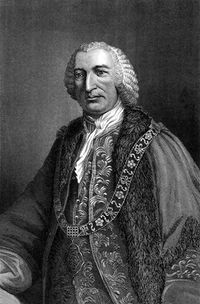Annotation:Beckford's Election: Difference between revisions
(Created page with "=='''Back to [[{{BASEPAGENAME}}]]'''== ---- <p><font face="garamond, serif" size="4"> '''BECKFORD'S ELECTION.''' English, Country Dance Tune (whole time). B Flat Major. Standa...") |
No edit summary |
||
| Line 2: | Line 2: | ||
---- | ---- | ||
<p><font face="garamond, serif" size="4"> | <p><font face="garamond, serif" size="4"> | ||
'''BECKFORD'S ELECTION.''' English, Country Dance Tune (whole time). B Flat Major. Standard tuning (fiddle). AABBCC. | '''BECKFORD'S ELECTION.''' English, Country Dance Tune (whole time). B Flat Major. Standard tuning (fiddle). AABBCC. The title probably references the election of William Beckford [http://en.wikipedia.org/wiki/William_Beckford_%28politician%29] (1709–1770) to the office of Lord Mayor of London in 1769, he second election to the position (the first was in 1762). Beckford was born in Jamaica but spent most of his adult life in London serving in various political offices. He was also reputed to have been the wealthiest man in England of his time, with extensive holdings in the cloth industry, property, government bonds, and sugar plantations. | ||
[[File:beckford.jpg|200px|thumb|left|William Beckford]] | |||
His son, also William Beckford [http://rictornorton.co.uk/beckfor1.htm] (1760-1844), the "Fool of Fontill", inherited his wealth and was in interesting character in his own right. | |||
<br> | <br> | ||
<br> | |||
</font></p> | </font></p> | ||
<p><font face="garamond, serif" size="4"> | <p><font face="garamond, serif" size="4"> | ||
Revision as of 23:21, 29 December 2014
Back to Beckford's Election
BECKFORD'S ELECTION. English, Country Dance Tune (whole time). B Flat Major. Standard tuning (fiddle). AABBCC. The title probably references the election of William Beckford [1] (1709–1770) to the office of Lord Mayor of London in 1769, he second election to the position (the first was in 1762). Beckford was born in Jamaica but spent most of his adult life in London serving in various political offices. He was also reputed to have been the wealthiest man in England of his time, with extensive holdings in the cloth industry, property, government bonds, and sugar plantations.

His son, also William Beckford [2] (1760-1844), the "Fool of Fontill", inherited his wealth and was in interesting character in his own right.
Source for notated version:
Printed sources: Longman & Co. (Twenty Four Country Dances for the Year 1770), 1770; p. 36. Longman, Lukey & Broderip (Bride's Favourite Collection of 200 Select Country Dances, Cotillons), 1776; p. 36.
Recorded sources:
